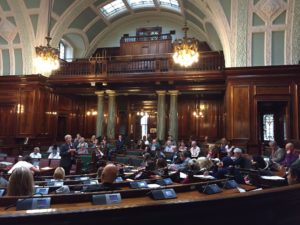A new report is published today (Friday 1st December, 2017) from the Third Sector Trends Study which will show that thousands of charities help address poverty across the North of England.
The report, Tackling Poverty in the North: the role of third sector organisations, is based on a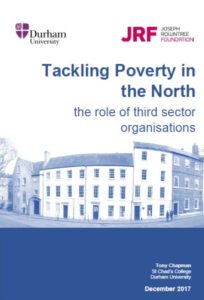 survey of 3,500 charities across the North East, North West and Yorkshire and Humber to capture their contribution in the region.
survey of 3,500 charities across the North East, North West and Yorkshire and Humber to capture their contribution in the region.
As a national charitable organisation which seeks to tackle poverty, Joseph Rowntree Foundation commissioned this short report to assess the extent to which Third Sector organisations contribute towards solving poverty in the North of England.
Author of the report, Professor Tony Chapman, commented:
“Many charities which aim to tackle poverty in the north of England are working hard to influence local public sector organisations in order bring more resources to bear on growing demand for services. But many are struggling to keep up, 26% of such charities are drawing upon their reserves to meet demand compared with just 16% of general charities.”
It is estimated that 5,000 Third Sector Organisations (TSOs) directly tackle the issue of poverty in the North of England and a further 3,200 TSOs address associated issues surrounding poverty.
The report shows TSOs tackling poverty are supported by 160,200 volunteers in the North of England who provide 11.5 million hours of work each year. The ‘replacement’ value of this contribution is between £83m (at national minimum wage) or £140m (at 80% of the average regional wage).
The number of volunteers is rising faster for charities tackling poverty than general charities – suggesting that this issue is highest on the priority list amongst members of the general public.
Over 45,000 people are employed by 3,900 TSOs directly addressing the issue of poverty in the North of England. The salary value of this work is between £912m and £1.1bn.TSOs which address the issue of poverty are generally optimistic that they will be able to raise sufficient income to meet the challenges of the future: 44% expect that their income will rise over the next two years compared with 32% of general charities.
However, there is also widespread pessimism about future levels of funding from public sector sources: 50% of TSOs tackling poverty think that statutory income will fall over the next two years compared with 46% of general charities.
The issue of poverty is rising on the political agenda. This research shows that TSOs which directly address the issue of poverty are the most likely to ‘strongly agree’ that they are attempting to influence local public-sector policy makers (50%) compared with 29% of general charities.
The Third Sector Trends survey was designed to examine how TSOs fare over time in the context of change. The findings presented in this report are based on a robust research methodology which has evolved over the last eight years to produce comparable time-series data.
The report can be downloaded here:Tackling Poverty in the North – Third Sector Trends.

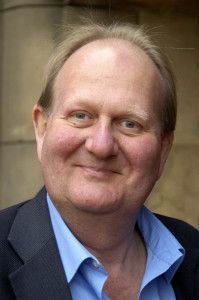
 Professor Fred Robinson has been working with Professor Keith Shaw and Sue Regan of Northumbria University on a major study of governance in the North East of England. The findings have just been published; the Report is now available at
Professor Fred Robinson has been working with Professor Keith Shaw and Sue Regan of Northumbria University on a major study of governance in the North East of England. The findings have just been published; the Report is now available at 
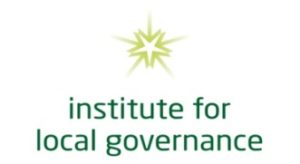
 Weston Foundation, includes responses from 1,462 third sector organisations in the North West of England.
Weston Foundation, includes responses from 1,462 third sector organisations in the North West of England. wo other major studies in North East England, funded by Community Foundation Tyne & Wear and Northumberland (who are now responsible for the legacy of the Northern Rock Foundation Third Sector Trends study and for the development of future iterations of the project) and Yorkshire and the Humber funded by Joseph Rowntree Foundation.
wo other major studies in North East England, funded by Community Foundation Tyne & Wear and Northumberland (who are now responsible for the legacy of the Northern Rock Foundation Third Sector Trends study and for the development of future iterations of the project) and Yorkshire and the Humber funded by Joseph Rowntree Foundation.
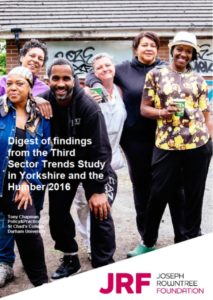
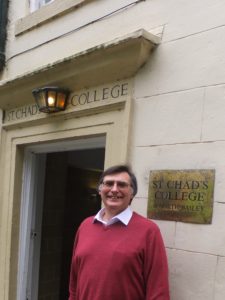 ents in Durham University Business School.
ents in Durham University Business School.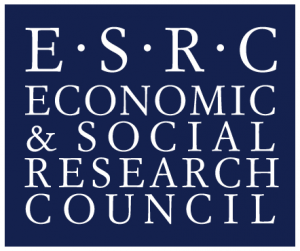 This is the first time in the project that public-sector organisations involved in the project have come together with other funding organisations, infrastructure bodies and practicing third sector organisations.
This is the first time in the project that public-sector organisations involved in the project have come together with other funding organisations, infrastructure bodies and practicing third sector organisations.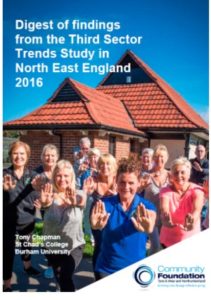 This report presents key findings from the Third Sector Trends study in 2016 from across Northern England and specifically in North East England and for each of its four sub-regions: Northumberland, Tyne and Wear, County Durham and Tees Valley. Key findings can be found in the
This report presents key findings from the Third Sector Trends study in 2016 from across Northern England and specifically in North East England and for each of its four sub-regions: Northumberland, Tyne and Wear, County Durham and Tees Valley. Key findings can be found in the 